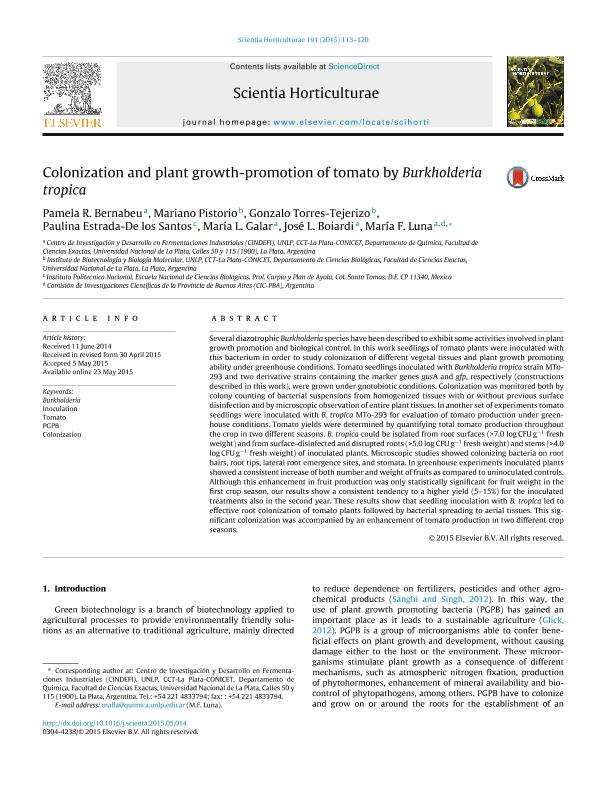Mostrar el registro sencillo del ítem
dc.contributor.author
Bernabeu, Pamela Romina

dc.contributor.author
Pistorio, Mariano

dc.contributor.author
Torres Tejerizo, Gonzalo Arturo

dc.contributor.author
Estrada De los Santos, Paulina
dc.contributor.author
Galar, Maria Lina

dc.contributor.author
Boiardi, Jose Luis

dc.contributor.author
Luna, Maria Flavia

dc.date.available
2018-06-08T21:15:13Z
dc.date.issued
2015-08
dc.identifier.citation
Bernabeu, Pamela Romina; Pistorio, Mariano; Torres Tejerizo, Gonzalo Arturo; Estrada De los Santos, Paulina; Galar, Maria Lina; et al.; Colonization and plant growth-promotion of tomato by Burkholderia tropica; Elsevier Science; Scientia Horticulturae; 191; 8-2015; 113-120
dc.identifier.issn
0304-4238
dc.identifier.uri
http://hdl.handle.net/11336/48021
dc.description.abstract
Several diazotrophic Burkholderia species have been described to exhibit some activities involved in plant growth promotion and biological control. In this work seedlings of tomato plants were inoculated with this bacterium in order to study colonization of different vegetal tissues and plant growth promoting ability under greenhouse conditions. Tomato seedlings inoculated with Burkholderia tropica strain MTo-293 and two derivative strains containing the marker genes gusA and gfp, respectively (constructions described in this work), were grown under gnotobiotic conditions. Colonization was monitored both by colony counting of bacterial suspensions from homogenized tissues with or without previous surface disinfection and by microscopic observation of entire plant tissues. In another set of experiments tomato seedlings were inoculated with B. tropica MTo-293 for evaluation of tomato production under greenhouse conditions. Tomato yields were determined by quantifying total tomato production throughout the crop in two different seasons. B. tropica could be isolated from root surfaces (>7.0 log CFU g−1 fresh weight) and from surface-disinfected and disrupted roots (>5.0 log CFU g−1 fresh weight) and stems (>4.0 log CFU g−1 fresh weight) of inoculated plants. Microscopic studies showed colonizing bacteria on root hairs, root tips, lateral root emergence sites, and stomata. In greenhouse experiments inoculated plants showed a consistent increase of both number and weight of fruits as compared to uninoculated controls. Although this enhancement in fruit production was only statistically significant for fruit weight in the first crop season, our results show a consistent tendency to a higher yield (5–15%) for the inoculated treatments also in the second year. These results show that seedling inoculation with B. tropica led to effective root colonization of tomato plants followed by bacterial spreading to aerial tissues. This significant colonization was accompanied by an enhancement of tomato production in two different crop seasons.
dc.format
application/pdf
dc.language.iso
eng
dc.publisher
Elsevier Science

dc.rights
info:eu-repo/semantics/openAccess
dc.rights.uri
https://creativecommons.org/licenses/by-nc-nd/2.5/ar/
dc.subject
Burkholderia
dc.subject
Inoculation
dc.subject
Tomato
dc.subject
Colonization
dc.subject
Pgpb
dc.subject.classification
Otras Biotecnología Agropecuaria

dc.subject.classification
Biotecnología Agropecuaria

dc.subject.classification
CIENCIAS AGRÍCOLAS

dc.title
Colonization and plant growth-promotion of tomato by Burkholderia tropica
dc.type
info:eu-repo/semantics/article
dc.type
info:ar-repo/semantics/artículo
dc.type
info:eu-repo/semantics/publishedVersion
dc.date.updated
2018-06-08T14:28:31Z
dc.journal.volume
191
dc.journal.pagination
113-120
dc.journal.pais
Países Bajos

dc.journal.ciudad
Amsterdam
dc.description.fil
Fil: Bernabeu, Pamela Romina. Consejo Nacional de Investigaciones Científicas y Técnicas. Centro Científico Tecnológico Conicet - La Plata. Centro de Investigación y Desarrollo en Fermentaciones Industriales. Universidad Nacional de la Plata. Facultad de Ciencias Exactas. Centro de Investigación y Desarrollo en Fermentaciones Industriales; Argentina
dc.description.fil
Fil: Pistorio, Mariano. Consejo Nacional de Investigaciones Científicas y Técnicas. Centro Científico Tecnológico Conicet - La Plata. Instituto de Biotecnología y Biología Molecular. Universidad Nacional de La Plata. Facultad de Ciencias Exactas. Instituto de Biotecnología y Biología Molecular; Argentina
dc.description.fil
Fil: Torres Tejerizo, Gonzalo Arturo. Consejo Nacional de Investigaciones Científicas y Técnicas. Centro Científico Tecnológico Conicet - La Plata. Instituto de Biotecnología y Biología Molecular. Universidad Nacional de La Plata. Facultad de Ciencias Exactas. Instituto de Biotecnología y Biología Molecular; Argentina
dc.description.fil
Fil: Estrada De los Santos, Paulina. Instituto Politecnico Nacional; México
dc.description.fil
Fil: Galar, Maria Lina. Provincia de Buenos Aires. Gobernación. Comisión de Investigaciones Científicas; Argentina. Consejo Nacional de Investigaciones Científicas y Técnicas; Argentina
dc.description.fil
Fil: Boiardi, Jose Luis. Consejo Nacional de Investigaciones Científicas y Técnicas. Centro Científico Tecnológico Conicet - La Plata. Centro de Investigación y Desarrollo en Fermentaciones Industriales. Universidad Nacional de la Plata. Facultad de Ciencias Exactas. Centro de Investigación y Desarrollo en Fermentaciones Industriales; Argentina
dc.description.fil
Fil: Luna, Maria Flavia. Consejo Nacional de Investigaciones Científicas y Técnicas. Centro Científico Tecnológico Conicet - La Plata. Centro de Investigación y Desarrollo en Fermentaciones Industriales. Universidad Nacional de la Plata. Facultad de Ciencias Exactas. Centro de Investigación y Desarrollo en Fermentaciones Industriales; Argentina
dc.journal.title
Scientia Horticulturae

dc.relation.alternativeid
info:eu-repo/semantics/altIdentifier/url/http://www.sciencedirect.com/science/article/pii/S0304423815002629
dc.relation.alternativeid
info:eu-repo/semantics/altIdentifier/doi/https://dx.doi.org/10.1016/j.scienta.2015.05.014
Archivos asociados
